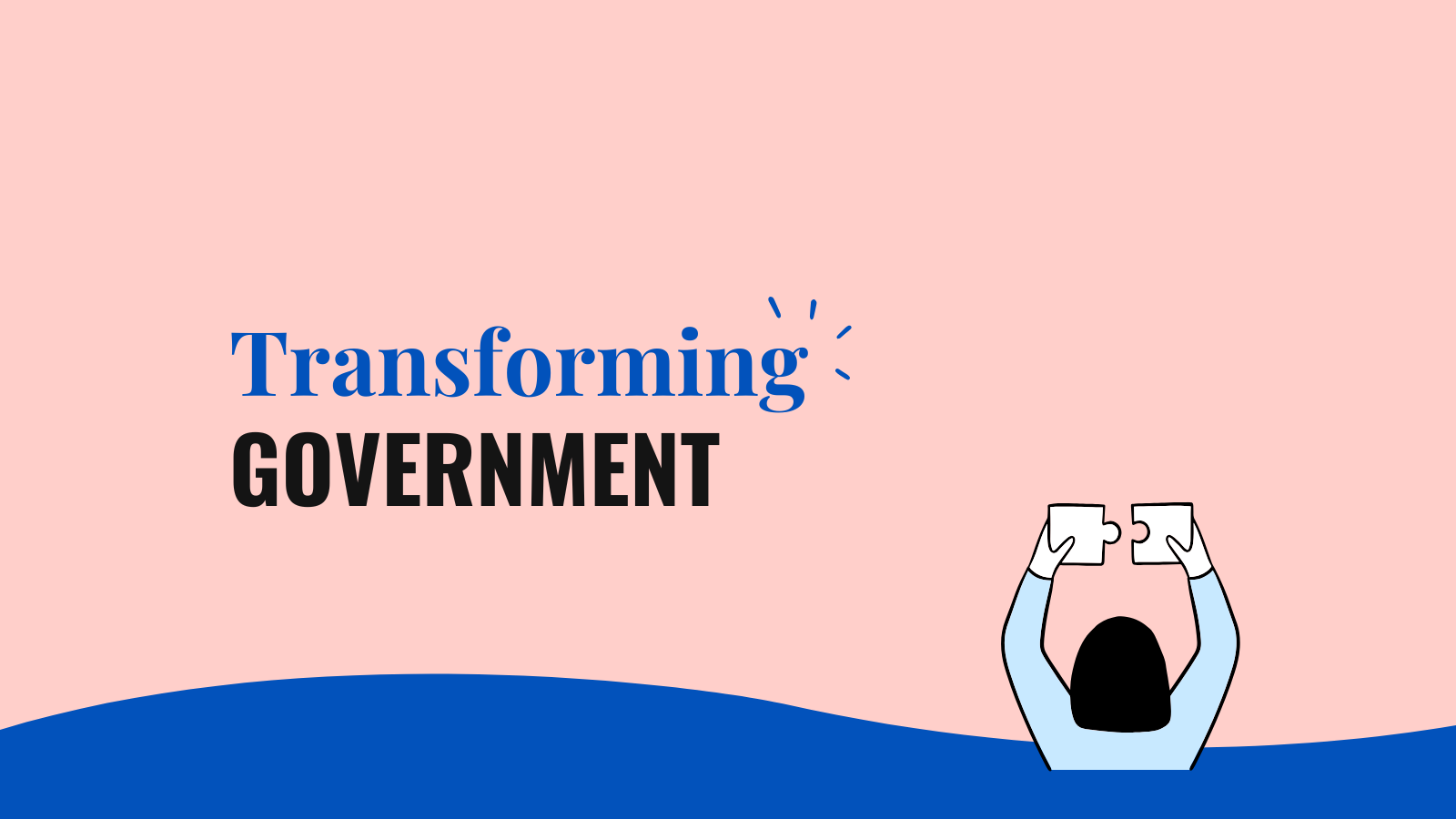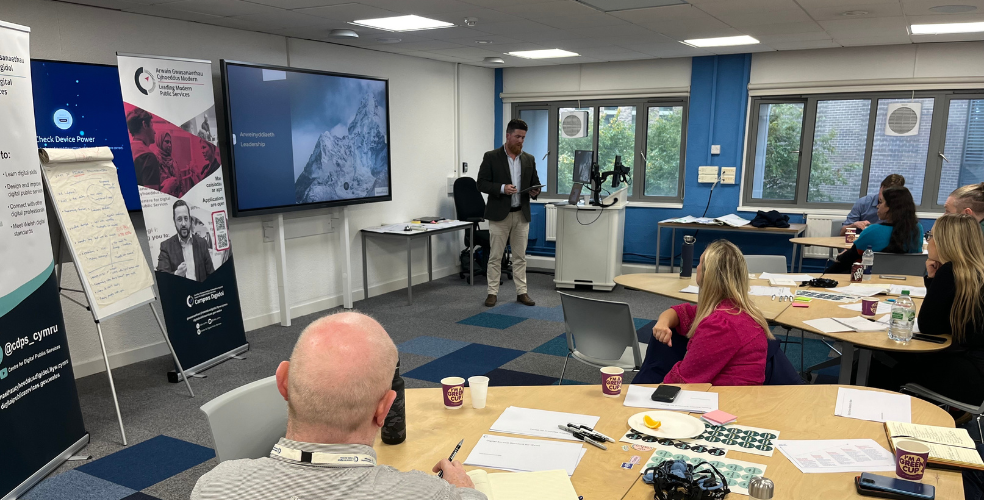Last week marked the exciting launch of the Leading Modern Public Services programme in Wales. This five day course, which will take place over a three month period, aims to equip public service leaders with the knowledge and tools to shape the future of digital services.
Hosted at the University of Wales Trinity Saint David Business Centre in Swansea, the programme was designed in collaboration with the Centre for Digital Public Services (CDPS) and TPXimpact. It brought together 15 participants from nine organisations across Wales, all of which are committed to transforming how public services are delivered in a modern, digital world.
The first two days were packed with insights from speakers, practical exercises, and lively discussions on digital transformation and maturity, systems leadership, agile approaches, and the ethical implications of AI.
Day one: Setting the stage for transformation
Welcome and overview
The programme began with an enthusiastic welcome from Peter Thomas, Head of Digital Skills and Capability at CDPS and the organisation’s Communications Manager Mike Erskine. Their opening remarks highlighted the significance of digital leadership in the evolving public sector landscape and fostering multi-disciplinary teams to tackle the complex challenges facing public services today.
Tash Willcocks from TPXimpact followed with a warm up session which encouraged participants to reflect on their own experiences and contexts, setting the stage for open dialogue and collaborative learning throughout the course. Collaboration and engaging in the network were central themes of the programme, so mixing the attendees was emphasised throughout so they could meet and connect with all of the group.
Understanding digital transformation
Tash and Ben Holliday, Chief Design Officer at TPXimpact, explored the question: What is digital transformation in your context? This interactive discussion encouraged participants to think about what digital transformation means for their own teams and organisations, considering both the opportunities and challenges they face.
Ben then followed this with an in-depth introduction to digital transformation, exploring some of the key themes in his book, Multiplied. He emphasised the need to rethink systems and services as part of how organisations respond to change, and spoke about how we can approach the challenges and opportunities of emerging technologies like AI.
Exploring digital maturity
After lunch, the programme moved into a hands-on workshop focused on digital maturity. Participants worked through an exercise to assess their organisations' digital maturity, identifying where they are on their journey and what steps they need to take to move forward. This session laid the groundwork for future conversations about scaling digital efforts and fostering leadership at all levels.
Insights from Carmarthenshire County Council
The rest of our first afternoon featured a keynote session from Gareth Jones, Chief Digital Officer at Carmarthenshire County Council. Gareth shared real-world examples of how digital transformation is being implemented in local government, particularly how multi-disciplinary teams are essential to successful change. His reflections highlighted the importance of leadership in creating an environment where innovation can flourish, and how digital initiatives must always be designed with people at their heart.
One of Gareth’s key takeaways, echoed throughout the day, was that "everything we do requires multi-disciplinary teams. We can’t do it on our own.", underscoring the need for collaboration and breaking down silos to truly transform public services.
Day two: Systems leadership, the wider Welsh context and ethical considerations
Reflecting on day one and introducing systems leadership
The second day began with a reflective session. Tash asked participants to think about the challenges and opportunities discussed the day before, followed by an introduction to systems leadership. Systems leadership is a concept that emphasises leading beyond boundaries, recognising the interdependencies inside organisations and between different parts of the wider systems our organisations are part of. It’s about the need for digital leaders to take collective action to support wider-scale systems change .
It was great to hear from voices in the room as we explored this topic with systems leadership resonating strongly with the cohort, especially given the cross-organisational nature of public services in Wales. As leaders, the participants were challenged to think about how they can influence not just their own teams, but the wider ecosystem in which they operate.
Agile approaches: The good, the bad, and the ugly
Moving into a session based around ‘agile’ working, we arranged small teams around people who were used to agile and those who weren’t. Each team had a good balance, so we went into our intro agile methodologies, but with a twist. Rather than a traditional talky lecture, participants engaged in group discussions to share their own experiences of implementing agile practices in their organisations. The room was alive with stories of successes, as well as candid admissions of what hadn’t worked as planned. This session provided valuable insights into the practical realities of adopting an agile mindset, with participants reflecting on both the benefits and the obstacles they had encountered.
Sport Wales and CDPS case study
After lunch, the attendees were joined by Steffan Berrow from Sport Wales, who shared how the organisation partnered with CDPS to apply user-centred design and agile methods to their community sports grant application process. Steffan explained how this approach has made the grant process more inclusive, ensuring that it better serves all potential applicants. His case study provided a tangible example of how digital tools and design thinking can be applied to deliver better public services.
AI ethics and governance
The next afternoon session featured Smera Jayadeva from The Alan Turing Institute, who gave a thought-provoking presentation on AI ethics, governance, and procurement. Smera’s talk challenged participants to think critically about the impact of AI on public services, particularly in areas such as data privacy, bias, and accountability.
World Café: Reflecting on challenges and opportunities
Our second day concluded with a World Café session, where participants explored the three areas covered throughout the day, systems leadership and connectivity, wider challenges in ethics and tech, and how the Welsh digital landscape can support them in tackling current challenges and overcome barriers to digital transformation. They travelled from cafe to cafe building up ideas, with the hosts and then shaping them into challenges for the future sessions.
Looking ahead
The first two days of the Leading Modern Public Services programme were incredible. It’s always great to see a group of strangers work together so brilliantly on shared problems and challenges, creating connections and sharing best practices. The next session runs online, next month, focusing on teams and culture, followed by two more sessions in person which will explore trio writing and The Well-being of Future Generations Act, plus a design sprint and a grand showcase.
With a focus on collaboration, leadership, and ethical innovation, participants are already starting to reimagine how they can lead their organisations through digital change. As the programme continues, we look forward to deepening these conversations and supporting Wales’ public service leaders in shaping a brighter, more inclusive future.

Transforming Government
We partner with the institutions of Government to help them work better. Our approach delivers digital transformation in government that is user-centred, data-led and cost-effective.
Work with us
Designing behavioural change in the attention economy
How strategic design and technology can capture attention, shift behaviours, and deliver meaningful public services in an attention-limited world.
Read moreOur recent insights
Transformation is for everyone. We love sharing our thoughts, approaches, learning and research all gained from the work we do.

Budget 2025 reveals how digital funding really works
Background: The Budget was announced yesterday, it’s not announcing big new programmes of work - it’s fine tuning how the government's fiscal policy supports existing policy objectives. There’s takeaways for all digital leaders from this announcement and some thoughts about that to do next.
Read more
Unlocking the benefits of AI for charities
How human-AI collaboration can help charities get true value from their data, turning insights into impact.
Read more
What's the future for open data in the UK?
A decade ago, the UK was a leader in open data, but its prominence has faded. We examine why the focus has shifted and what the future holds for the role of open data in the public sector.
Read more

